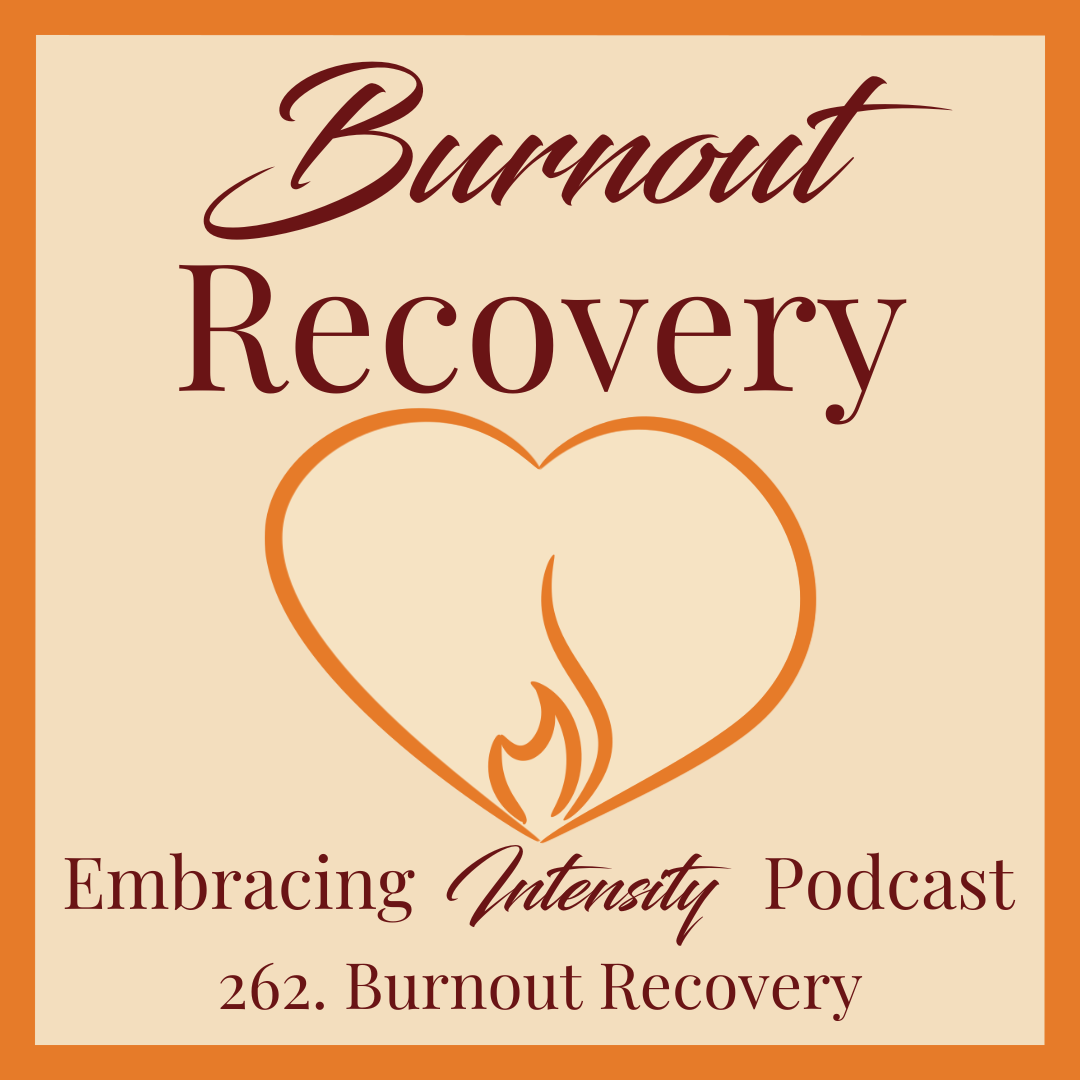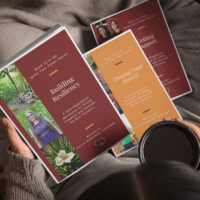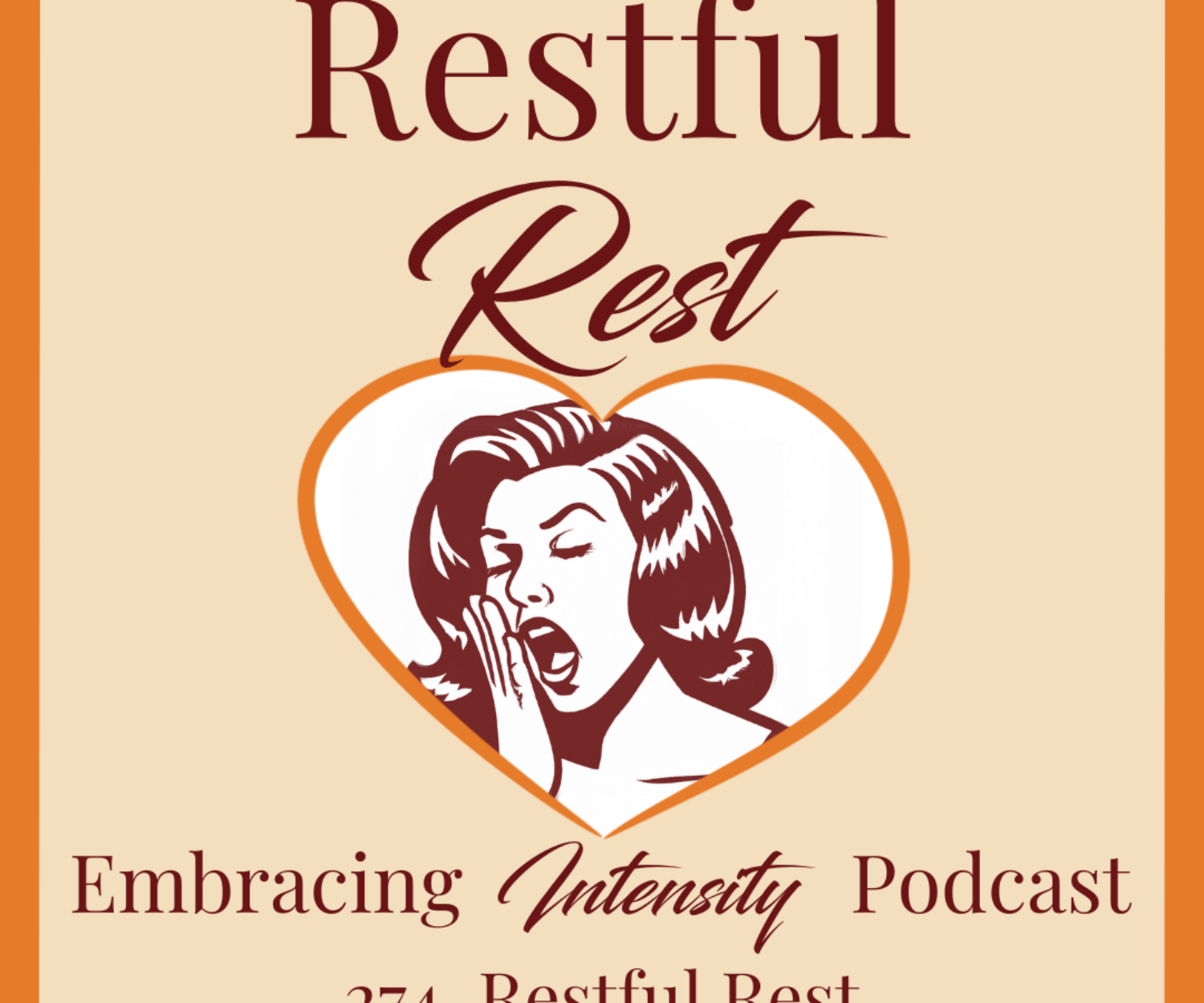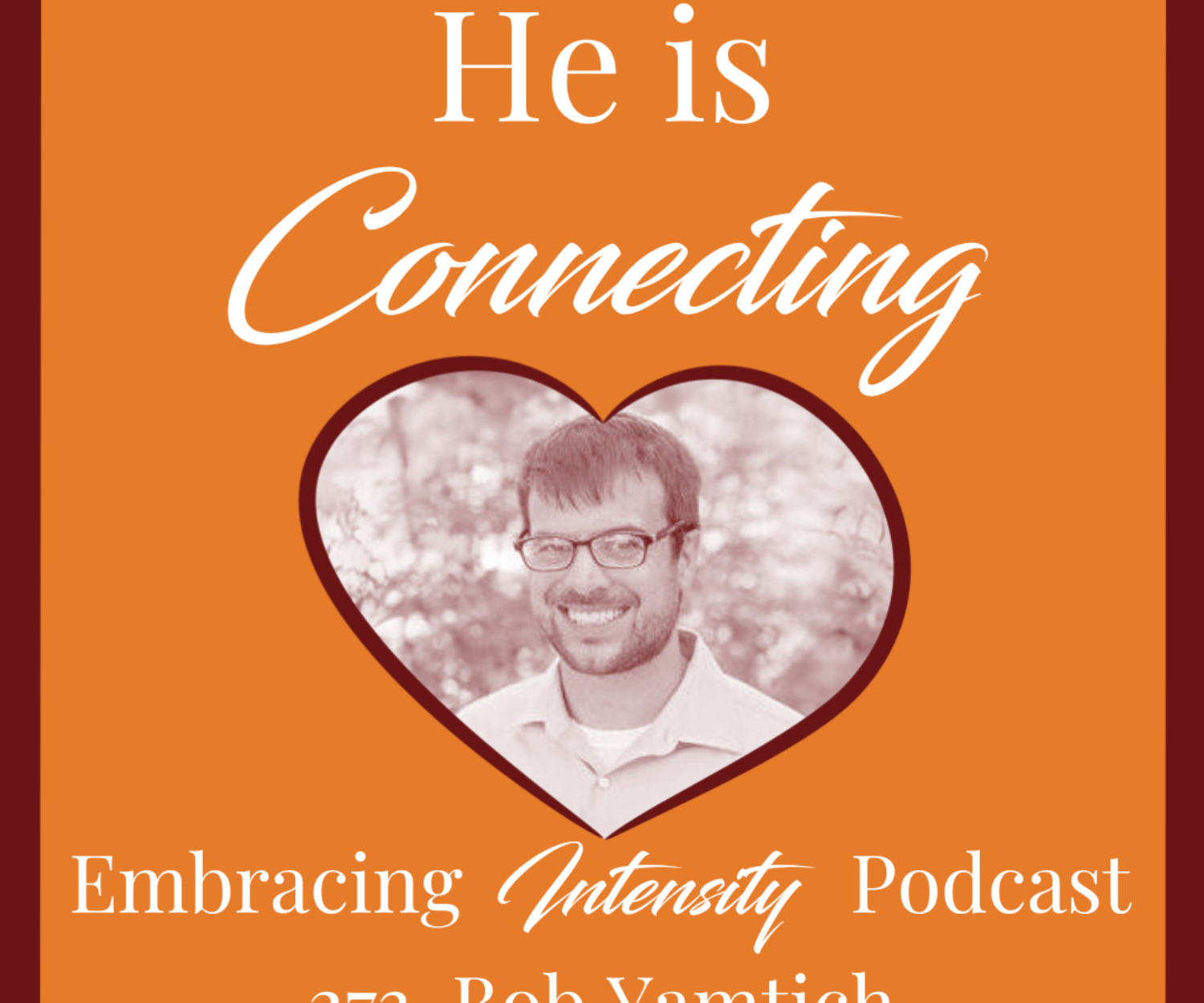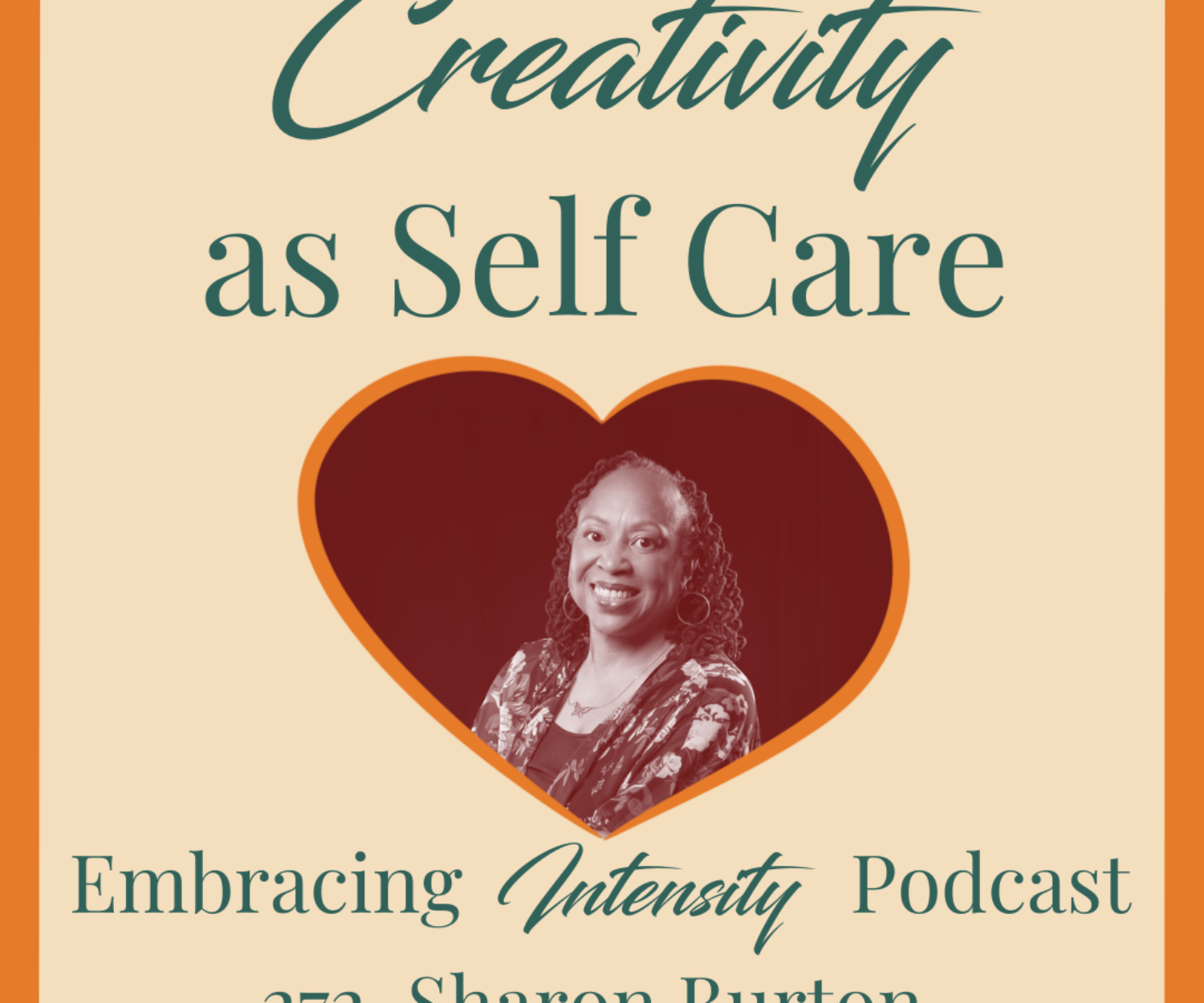Burnout Recovery
This week on Embracing Intensity, I share my experience with the physical and emotional exhaustion that comes with severe burnout. In this episode, I share updates on my personal life that have contributed to burnout, dive into my recovery process and discuss how to overcome burnout symptoms. I also share a preview of what I have coming up as I recover from burnout this summer!
Burnout can affect every aspect of your life, from your job to your personal relationships. It’s important to recognize the signs of burnout early on and take the necessary steps to address it. Whether it’s through improving your work-life balance, seeking social support, or making small changes to your daily routine, there are ways to recover and find relief from burnout.
Recent research has shown that burnout is not just a result of long hours and excessive stress, but also a combination of physical, emotional, and mental exhaustion. It can take a toll on your physical health, immune system, and even your mental well-being. That’s why it’s crucial to prioritize self-care and engage in activities that promote relaxation and rejuvenation.
Join Me
In this podcast, we’ll explore various burnout recovery techniques, such as incorporating physical activity, spending quality time with friends, and getting enough sleep. We’ll also discuss the importance of spending time on things we love, seeking professional help when needed, and finding support from friends, family members, and colleagues.
Join me as we navigate the journey of burnout recovery together. I’ll share my personal experiences, as well as insights from experts in the field, to help you create a burnout recovery plan that works for you. Whether you’re a busy professional, a parent, or someone struggling with burnout in any area of your life, this podcast is here to provide guidance and support.
So, grab a cup of tea, find a cozy spot, and let’s embark on the path to burnout recovery. Remember, you’re not alone, and there is hope for a full recovery. Let’s get started.
Explore More!
Giftedness * Identity * Intensity * Neurodivergence * Positive Disintegration * Relationships * Self Care * Self Regulation * Twice Exceptionality
In this episode:
- I discuss my recent absence from content creation due to burnout and chronic headaches.
- Factors that have contributed to my burnout including work-related stress and big life changes.
- Updates on what’s been happening for me this year personally.
- Giving myself permission not to be productive has been helpful in my burnout recovery.
- Reconnecting with friends and reaching out for support has been beneficial, as many friends are also struggling after the isolation of the pandemic.
- Engaging in activities that bring joy and relaxation, such as floating in a pool, can help with relaxation and letting go of stress.
- Incorporating movement, such as going for walks, and seeking body work and acupuncture can aid in burnout recovery.
- I am working on catching up on content for the planner club and developing neurodivergent-friendly planners for travel and relationships.
- I’m open to taking requests for specific planner content to make it more neurodivergent-friendly.
- I plan to create a printed planner using the disk bound system for customization.
- Adding a new course to my membership called “Befriending Your Brain, Self Assessment Course.”
- Members of my course membership will have access to upcoming calls, guest speakers, call recordings, and new content.
- I have many creative ideas and plans for the future, but I also need to honor my own burnout and recovery cycles.
- Our next monthly call about writing to heal takes place on the third Saturday of the month at 10:00 AM Pacific time.
Transcript
* Rough Transcript *
Ep. 262
Introduction
Aurora: Hello. It has been a long time since I’ve done a solo episode. But I’ve also been super behind on content in general because of a combination of extreme burnout. And chronic headaches, which have been contributed to by my glasses prescription, which I’m getting updated. So hopefully that will help down the road, but I’ve been working on showing up more imperfectly and just kind of showing up on making video shorts.
And so I decided to make a sort of longer one to kind of catch you up on where I’ve been, what’s been going on what I’ve been personally doing to help with my burnout and also what I have coming up ahead that I’m super excited about once I’m able to focus on it.
Catching Up
Aurora: So starting out, the last couple of years have been the most extreme burnout that I have ever, ever gone through. And I realized that as someone who talks about energy regulation and self-regulation and not getting burnt out, I was relying a lot on my summer breaks to recover from my school year.
And between COVID a couple of years ago and then a huge move last year that left us in an Airbnb over the summer. I haven’t really had a solid summer break in a long time. So last school year, I felt like I was just pushing through to the end of the school year and then we decided to move and I really didn’t get any refreshing rest over that time at all.
We moved into our house right before a family trip. And then the following week I started school again. So I’ve been pushing through even more this year. The move was definitely a good thing because living closer to town, closer to friends and family has been very good for all of us. But it did come at the cost of my summer and resting over the summer.
So I’ve been pretty gentle with myself this past year and not really pushing myself to do too much. But it’s been also frustrating because I have a lot, a lot of ideas that I want to implement and haven’t had the energy to implement them.
Planner Club
Aurora: So I started the planner club, which was something that was creating planner content each month that is specifically designed to help for those of us with executive functioning issues. Neurodivergent folks.
And I was putting out content every month, which was great, but I also kind of hit a wall there because now I realize with my glasses, it’s been really hard even then to focus on that. It was a great thing though, because what I realized is when I was in brain fog mode,
I could actually do better with creating visuals then with creating words, which is why I have been making these tools and making these visuals because that’s something that I could do when I was in a state of kind of mushy brain.
But when my vision started to get bad with my glasses, I didn’t really connect the dots cause I have so many different reasons for getting headaches. And so hopefully that’s resolved, hopefully by next week I’ll have new glasses and I’ll be able to start doing that content again. So I’m pretty excited about that.
Personal Changes
Aurora: And, let’s see. A couple of other things that kind of hit me this year. My relationship ended. My spouse and I decided that we’ve basically been friends for the last several years since they started transitioning gender. And we finally realized that it was time to move on because we were no longer in a romantic relationship. So that ended, but it was a very positive ending for both of us.
And also I found out that I’m going to be leaving the school that I’ve been at for 14 years, which is actually longer than any of the longest relationships that I’ve had. And all of these changes have been positive and really kind of got me out of some ruts that I was really just too tired and burnt out to deal with.
And so all of them are really good things down the road, but in the meantime, I’m still kind of resting and recovering from just a lot of change at once. So that’s where I’m at now. I’m about halfway, actually more than halfway through my summer. And I’m just trying to really take care of myself and rest.
And, I have a lot of optimism about all the things that I want to do, things that I want to work on, but haven’t had a lot of energy to execute them.
Burnout Recovery
Aurora: So that brings the question about what I personally have been doing about my own burnout, recovery and things that have helped things that maybe I’m still working on. It’s been hard for me to talk about because I feel like I’m very much not where I wanted to be by now this summer. And a huge part of that is because my sleep has just been terrible. And I was hoping that with the sleep study, the sleep apnea.
That I would get something to help. And first it’s a mouth guard that’s taking way longer to get. But the one that I tested in the meantime made me realize, I don’t think a mouth guards really gonna work. Because of sensory issues and jaw tightness. So I’m still kind of working on.
What to do to help with my sleep. I’m going to have a acupuncture coming up. So I’m excited about that, but that has been probably the biggest barrier to recovering from the burnout is that my sleep quality has not been great.
What’s helped?
Aurora: Some of the things that have helped are one. The biggest thing is giving myself permission not to be productive. So for the first month of my summer, I decided, you know what, I’m just going to let myself be and not be productive and rest and not feel like I have to catch up on everything because I really, really have needed it.
And so that’s been really a huge help for me because, you know, with that idea of contaminated time when we’re doing one thing, but thinking about something else, Rest isn’t restful if you’re feeling guilty about it. So that’s one thing that I’ve been really trying to do.
Another thing is reconnecting with friends. So right as summer break started, I connected with a lot of friends all at once.
I realized that it’s good to kind of space that out. But one of the things that I realized is that you don’t have to plan some big connecting in person having coffee, scheduling a time, all of that, to connect with your friends. I have been so out of practice of just calling up a friend and just saying, Hey, how’s it going?
And I’m always afraid to reach out because I don’t want to be a burden. And I realized recently, That a lot of my friends are going through the same thing and they also haven’t wanted to be a burden. And so I realized that it’s important to just start reaching out to friends and reconnecting and checking in on them too, because chances are, they’re also struggling to reach out, especially after all of the isolation that we experienced through the pandemic. I feel like a lot of us are having a hard time reaching out again.
Reaching Out
Aurora: We’ve gotten out of our social network and social connection. So that’s been a huge thing is just calling up a friend and seeing how they’re doing or sending them a message and catching up that way and not feeling like it has to be some big scheduled event to connect with a friend.
Another big thing is just kind of reconnecting with things that I enjoy. That’s something that I’m trying to do a lot more of, but I’m also trying to remember what are the things that I enjoy that don’t involve. A lot. I strain. Because right now, those, those things are hard for me.
One of the things that has been really helpful when it comes to both, something that I enjoy and is really relaxing, is floating in the new pool that I got. So, I realize that when I’m just laying down or taking a nap, I don’t always feel like I can fully relax, but when I’m floating, I feel like that’s the one time where I can like, totally let go, totally relax, and just relax all my muscles. And I feel like that’s something that’s been really helpful for me to observe is when is it that I feel most relaxed and do more of that?
Also getting movement in has been really helpful. And so I’ve been trying to do go for a lot more walks. And also doing some things like body work and acupuncture. Those are things I’m just getting started on. And so I’m hoping that those will help as well. So still working on the sleep issues, hopefully the vision stuff will resolve itself once I get my new glasses, but those are kind of some of the things that have been helping me.
What’s Next?
Aurora: And finally what. Do I have coming next? So once I get my new glasses and have time to really sit at the computer and not strain my eyes. I have a ton of things that I’ve been really excited about. And it’s, it’s actually kind of frustrating because I finally had money to pay for a marketing coach, pay for some virtual assistant time.
And support, but I haven’t had the mental capacity to actually work on the things to give them or to work with them on so that I can expand my content, expand my offerings. And so hopefully, as I really work on resting and recuperating, I’ll be able to come back with more energy, to focus on all those things. So some of the things that I have already started working on is catching up on the content for the planner club. And I do intend on having catching up with the months that I’ve missed.
With some mind maps and journal prompts, and I’m working on a neurodivergent friendly travel planner, which I’m really excited about. And another one that I really want to work on is a neurodivergent friendly relationship planner that talks about communication and connection and other things like that, specifically for neurodivergent folks to connect with other people.
And I’m also taking requests. So if you have a specific type of planner content that you would like to see made more, neurodivergent friendly. I am happy to take a look and see what I can do.
What I’ve been doing so far is taking planners like templates that I have on Canva.
Customized for Neurodivergent Brains
Aurora: And I’ve been specifically tailoring them to more neurodivergent specific issues like sensory issues, executive functioning, things like that. And then I’m also creating kind of a quick guide on how to use those tools. And so that’s something that I’ve been working on and each time has been a little bit more refined. And I may go back to some of the old tools that I made and add some additional stuff to those, to make it even more neurodivergent friendly.
So if there’s something specific that you think would be handy, let me know.
I also want to do a printed planner this year definitely before the end of the year so that we can have them for next. It won’t be dated because I find that dated planners are hard because we often have pages that we never ever use. And so.
I would like to create a printed planner that has pages using the disk bound system so that you can add your own pages, take them out, customize it in any way that you want. And so that’s something that I want to be doing in the fall. And then finally, as I get all my planner content kind of caught up and, and get ahead of myself so that I make sure that I have all the content ready to go as promised.
Befriending Your Brain
Aurora: Then I also am planning on adding a new course to my course membership, which is going to be the befriending, your brain, self assessment course. This is something that I’ve had in my head for over a year. I’ve been wanting to take my adult assessment that I do and take all of the self-assessment components and create a course out of it. That way people can use all of those self exploration tools, self-assessment tools, and learn more about themselves. And then talk about it with other people who are doing the same thing and learn more about how they think and learn and their strengths and challenges.
I’ve gotten a lot of positive feedback for my adult assessment, but it’s one-on-one and so A it’s costly and B it takes me a lot of time. And I can’t do that many of them. So I would really love to get this course out and I have the outline of it. I have so much information that I want to put together for it. I just have to get my brain back to that point where I can really clearly map it out so that it’s a usable user-friendly tool for other people to do their own self exploration.
So. Those are all things that I’m working on, things that I have down the road. And so if you are already a member in my course membership, You also gain access to all of our upcoming calls, guests, call recordings and all of that new content. And also all of the planner club content you get through the course membership as well.
Looking Ahead!
Aurora: The planner club is just the monthly tools, which are all kind of visual tools that you can use to help organize your brain, organize your space. Organize yourself. And so those are things that I’ll be coming out with regularly, new content in both of those areas.
So now, you know, a little bit more about where I’m at, what I’ve been up to and what I have coming up ahead and just know that I have a ton more things that I want to be working on. I have all kinds of creative ideas that I would love to implement. And I also have to honor my own cycles when it comes to burnout and recovery.
Oh, and one final note, our speaker who was going to come for this last month in this coming month, was unavailable. And so I had to cancel last month, but we do have a replacement speaker for next month. And I’m super excited because it was our biggest guest’s call a couple of years ago with Nika, who has the Write to heal project. And so she’s going to be talking about writing to heal, and I’m super excited about that. We were going to do a neurodivergent writing workshop. So we’re able to still keep that thread about writing and using it as a tool for healing.
So you can join us. It’s the third Saturday of the month at 10:00 AM Pacific. So hope to see there. It’s going to be a great call and you can find the discussion recording in the embracing intensity membership.
Have a good week!

